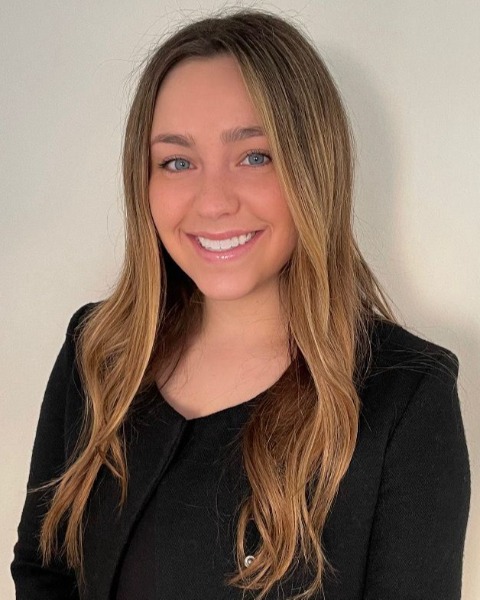Gastroenterology/Hepatology
Category: Abstract Submission
Gastroenterology/Hepatology I
13 - Standardized Yoga & Meditation Program for Stress Reduction for Adolescents with Irritable Bowel Syndrome
Saturday, April 23, 2022
3:30 PM - 6:00 PM US MT
Poster Number: 13
Publication Number: 13.207
Publication Number: 13.207
Sydney Topfer, Cooper Medical School of Rowan University, Philadelphia, PA, United States; Marisa Wozniak, Cooper Medical School of Rowan University, Philadelphia, PA, United States; Natalie Morris, Cooper Medical School of Rowan University, Philadelphia, PA, United States; Basant K. Pradhan, Cooper Medical School of Rowan University, Camden, NJ, United States; Katherine Kaminski, Cooper Medical School of Rowan University, Clifton, NJ, United States; Alla Kushnir, The Children's Regional Hospital at Cooper, Camden, NJ, United States

Sydney Topfer, Bachelor of Science
Medical Student
Cooper Medical School of Rowan University
Philadelphia, Pennsylvania, United States
Presenting Author(s)
Background: IBS, or Irritable Bowel Syndrome, is the most common cause of general recurrent abdominal pain (RAP) in children. This discomfort often significantly impacts the patient’s life, leading to emotional stress, decreased quality of life due to necessary changes in daily living to accommodate bathroom patterns, as well as anxiety and depression. Since IBS is often accompanied by anxiety, along with other psychological and quality of life issues, we are proposing that practicing yoga and mindfulness will decrease anxiety and increase quality of life for patients with IBS.
Objective: To measure the impact of a brief, at-home, 6-week twice per week Standardized Yoga & Meditation Program for Stress Reduction (SYMPro-SR) program on anxiety, IBS symptoms, and quality of life in children ages 12-21 years old diagnosed with Irritable Bowel Syndrome.
Design/Methods: Using charts from pediatric gastroenterology office from January 2020 to September 2021, we identified and reached out to children ages 12-21 who suffered from IBS. If their parents and they agreed to participate in the study, they filled out the Screen for Child Anxiety Related Disorders, Pediatric Quality of Life Inventory questionnaires and Children Somatic Symptoms Inventory before and after a 6- week online yoga course. A yoga and mindfulness course was created as YouTube videos and access was granted to participants. Results of the questionnaires total scores and sub-scales were analyzed. ANCOVA was performed for repeated measures incorporating age, sex, baseline scores, etc. as covariates
Results: In this pilot study, 40 subjects were approached and 8 completed the videos. There were 4 females (50%), 6 Caucasian subjects (80%), 1 Asian subject (10%) and 1 African-American subject (10%). There were 4 subjects with IBS constipation (50%) and 4 with IBS mixed-type (50%). There was significant improvement in Pediatric Quality of Life post intervention (p = 0.01). The SCARED test was subdivided into six sections. The SCARED anxiety section significantly decreased post intervention (p = 0.01). There was a trend for improved outcomes in SCARED panic disorder and separation anxiety post intervention (p = 0.07 and 0.08 respectively). There was a post intervention improvement in a number of variables in the CSSI scale. Four of the 24 symptoms in the CSSI significantly improved post intervention.Conclusion(s): Teenagers with IBS were able to complete yoga videos at home, with improvement in quality of life, certain aspects of anxiety and a few somatic symptoms.
Children Somatic Symptom Inventory.png) Four of the 24 symptoms in the CSSI significantly improved post intervention.
Four of the 24 symptoms in the CSSI significantly improved post intervention.
Objective: To measure the impact of a brief, at-home, 6-week twice per week Standardized Yoga & Meditation Program for Stress Reduction (SYMPro-SR) program on anxiety, IBS symptoms, and quality of life in children ages 12-21 years old diagnosed with Irritable Bowel Syndrome.
Design/Methods: Using charts from pediatric gastroenterology office from January 2020 to September 2021, we identified and reached out to children ages 12-21 who suffered from IBS. If their parents and they agreed to participate in the study, they filled out the Screen for Child Anxiety Related Disorders, Pediatric Quality of Life Inventory questionnaires and Children Somatic Symptoms Inventory before and after a 6- week online yoga course. A yoga and mindfulness course was created as YouTube videos and access was granted to participants. Results of the questionnaires total scores and sub-scales were analyzed. ANCOVA was performed for repeated measures incorporating age, sex, baseline scores, etc. as covariates
Results: In this pilot study, 40 subjects were approached and 8 completed the videos. There were 4 females (50%), 6 Caucasian subjects (80%), 1 Asian subject (10%) and 1 African-American subject (10%). There were 4 subjects with IBS constipation (50%) and 4 with IBS mixed-type (50%). There was significant improvement in Pediatric Quality of Life post intervention (p = 0.01). The SCARED test was subdivided into six sections. The SCARED anxiety section significantly decreased post intervention (p = 0.01). There was a trend for improved outcomes in SCARED panic disorder and separation anxiety post intervention (p = 0.07 and 0.08 respectively). There was a post intervention improvement in a number of variables in the CSSI scale. Four of the 24 symptoms in the CSSI significantly improved post intervention.Conclusion(s): Teenagers with IBS were able to complete yoga videos at home, with improvement in quality of life, certain aspects of anxiety and a few somatic symptoms.
Children Somatic Symptom Inventory
.png) Four of the 24 symptoms in the CSSI significantly improved post intervention.
Four of the 24 symptoms in the CSSI significantly improved post intervention.